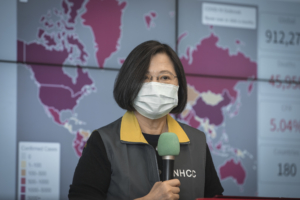Female Leaders in the Pandemic Find Success
 In the months since COVID-19 first emerged in late 2019, the world has experienced many challenges that have led people across countries to experience economic, social and political instability. The pandemic has also exposed another issue: COVID-19 has displayed the strengths of female leaders while highlighting the need for more opportunities for women in the future.
In the months since COVID-19 first emerged in late 2019, the world has experienced many challenges that have led people across countries to experience economic, social and political instability. The pandemic has also exposed another issue: COVID-19 has displayed the strengths of female leaders while highlighting the need for more opportunities for women in the future.
Female-led Countries Perform Better
Around the world, female leaders in the pandemic have been praised for their response to the global crisis.
New Zealand’s prime minister, Jacinda Ardern, has become a stellar example of thoughtful and resourceful leadership in handling COVID-19. Her decision to implement strict lockdown procedures at the beginning of the pandemic saved thousands of lives and the country’s economy. On June 8, months before many other areas, Ardern declared there were no longer any cases of COVID-19 in the country.
Chancellor Angela Merkel has done a significantly better job at controlling the virus in Germany than many of her European neighbors. Even though the virus hit Germany hard, the country “had about a quarter as many deaths as France,” in April.
In Taiwan, Tsai Ing-Wen combated COVID-19 early. By beginning testing in late December, she prevented the virus from getting out of control in its early stages. Praised for her approach to containing the virus, the president now has a 61% approval rating.
Such successes of female leaders in the pandemic are not isolated events. The strength, compassion, thoughtfulness and collaboration that women have shown throughout the pandemic have benefited the health and safety of their countries. Across the world, female-led countries “have suffered six times fewer confirmed deaths from COVID-19 than countries with governments led by men.”
The Strengths of Female Leadership
Women bring specific strengths to the table when it comes to leadership. Women are naturally more inclined to act compassionately and work cooperatively. These characteristics are especially important in the midst of the pandemic. Focusing on collaboration instead of competition is the only way to effectively handle an international crisis. Contact tracing, self-isolation and simply wearing a mask are all altruistic actions that depend on a cooperative response from the public. Leaders must serve as role models by exemplifying those actions.
Humility has also been recognized as a characteristic closely associated with women and is vital to managing the pandemic. Leaders must acknowledge that they cannot eradicate the virus alone and recognize the value of insight from experts like the medical community.
Female Experience and Crisis Management
Female leaders are also, to some degree, free from the expectations grounded in toxic masculinity, including the standard to act aggressively and competitively. This appeal to hyper-masculinity has appeared in some male-led countries during the pandemic. In the United States, for example, by calling himself a wartime president, President Trump has framed the virus as an enemy requiring the same aggression and violence as war. His decision not to wear a mask is an attempt to appear strong and assertive over his enemy. However, this kind of militaristic charisma does intimidate a virus. In contrast, many female leaders have “emphasized compassion and patience, rather than war and victory,” thus taking a more humane approach that prioritizes the health and safety of human lives over a desire to appear ‘tough’.
Women’s life experiences also inform their response to a crisis. Comprising the majority of essential workers and the newly unemployed, women may have a more empathetic response to the pandemic. Women of color “may be more attuned to the disproportionate impact of the virus on marginalized communities than people who have never had to think about marginalization before.”
For female leaders in the pandemic, these experiences bring to light the severity of the situation while fostering compassionate and collaborative solutions to overcome the crisis.
The Girls LEAD Act
The success of female leaders in fighting the pandemic has made one thing clear: women should receive greater political and leadership opportunities. The Borgen Project supports the Girls LEAD Act, which seeks “to strengthen the participation of adolescents, particularly girls, in democracy, human rights, and governance.”
The Act aims to expand opportunities for girls by implementing “activities to increase adolescent girls’ civic and political knowledge and skills and address barriers to political participation.” It also offers “foreign assistance funding for democracy, human rights, and governance programs.”
Female leaders in the pandemic have highlighted the importance of opening opportunities for women through legislation such as the Girls LEAD Act. Women’s ability to participate in politics and access leadership roles is not only of pivotal importance for gender equality but also imperative to the health and safety of our world.
– Jessica Blatt
Photo: Wikimedia
